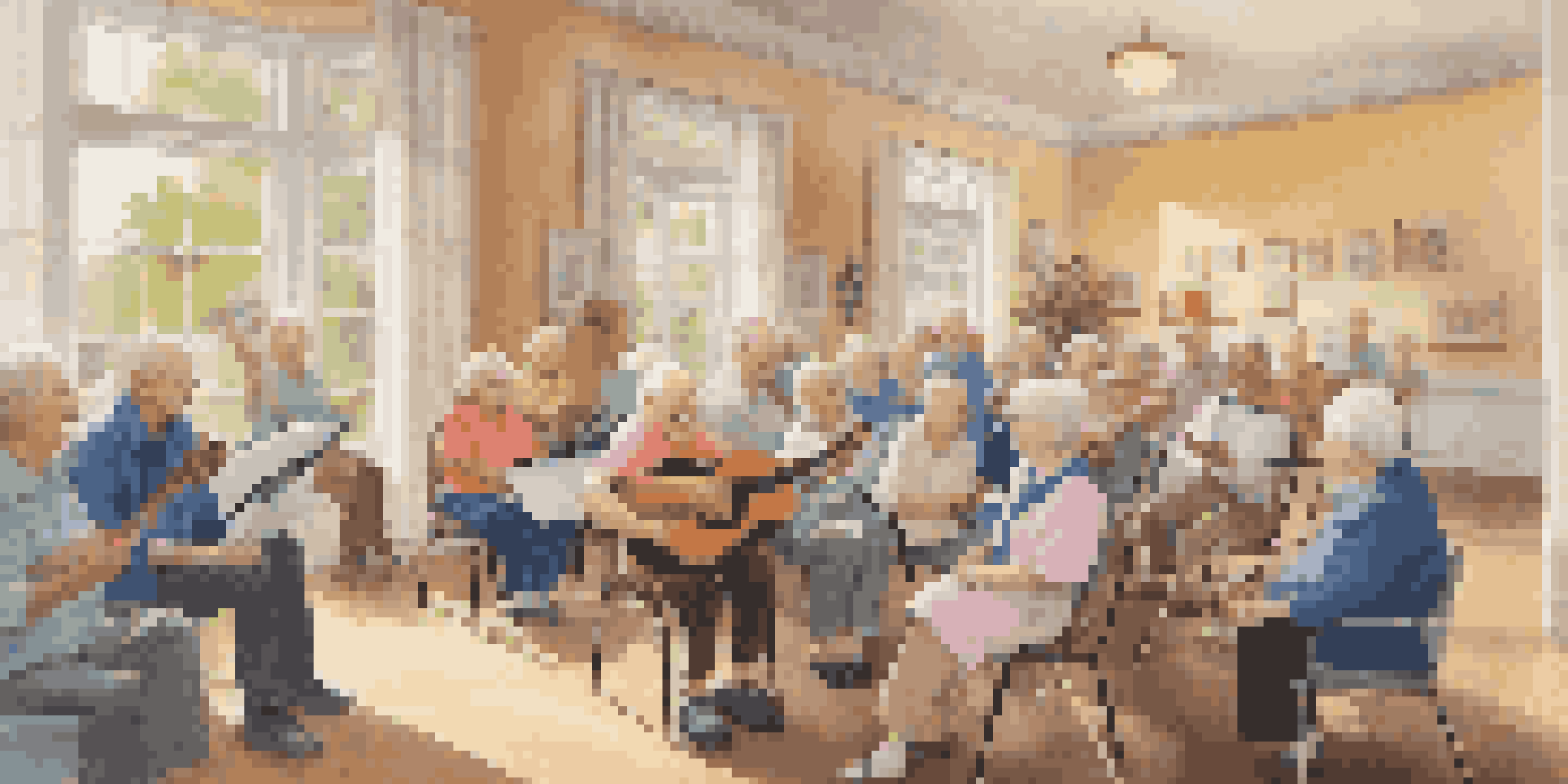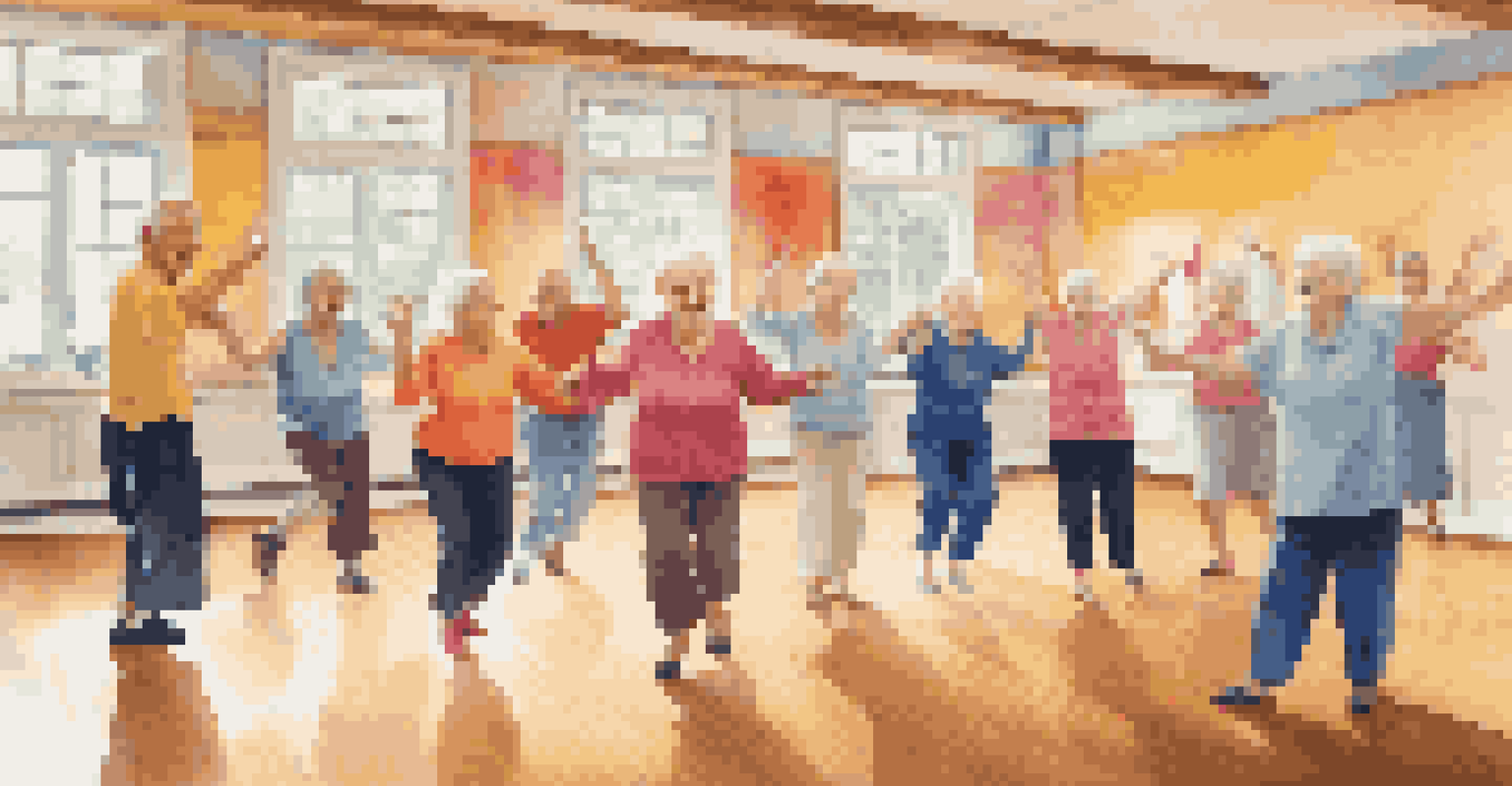The Benefits of Music in Care Facilities for the Elderly

Music as a Tool for Emotional Expression
For many elderly individuals, music serves as a powerful medium for expressing emotions. Whether it's the joy of a beloved song or the nostalgia of a past memory, music can evoke feelings that words often can't capture. This emotional connection can help seniors articulate feelings they may struggle to share otherwise.
Music can change the world because it can change people.
In care facilities, creating opportunities for musical engagement allows residents to express themselves freely. Activities like sing-alongs or music therapy sessions can foster a safe space for sharing emotions. When residents feel heard and understood, it can lead to improved emotional well-being.
Furthermore, music can act as a bridge to memories, helping seniors recall cherished moments from their past. This reminiscence can spark conversations, enhancing social interactions among residents and staff alike.
Enhancing Cognitive Function Through Music
Research has shown that music can stimulate cognitive functions in elderly individuals. Engaging with music can improve memory and attention, which are crucial for maintaining overall mental health. Listening to familiar tunes can activate brain regions associated with memory recall, making it easier for seniors to connect with their past.

Moreover, music can serve as a valuable tool in combating cognitive decline. Activities like music-based games or rhythm exercises can promote brain activity, helping to keep minds sharp. This cognitive stimulation is especially beneficial in care facilities where residents may be dealing with conditions like Alzheimer's or dementia.
Music Enhances Emotional Expression
Music provides elderly individuals a powerful way to express emotions and connect with cherished memories.
By incorporating music into daily routines, care facilities can create an environment that encourages mental engagement. Whether through listening, singing, or playing instruments, the therapeutic effects of music can significantly enhance cognitive resilience in seniors.
Fostering Social Connections Among Residents
Music has a unique ability to bring people together, making it an excellent tool for fostering social connections among elderly residents. Group activities centered around music, such as dance parties or choir sessions, can break down social barriers and encourage interaction. This sense of camaraderie can lead to meaningful friendships among residents.
Where words fail, music speaks.
Sharing musical experiences can also help reduce feelings of loneliness and isolation. When seniors engage in music-related activities together, they create bonds through shared enjoyment. These connections can enhance their overall quality of life and emotional well-being.
Additionally, staff can facilitate social engagement by incorporating music into daily activities. Whether it's playing background music during meals or organizing regular musical events, these initiatives can create a vibrant community atmosphere in care facilities.
Promoting Physical Well-Being with Music
Music isn't just good for the mind; it can also positively impact physical health in elderly individuals. Rhythmic music can encourage movement, making it an effective tool for promoting physical activity. Whether through dance, chair exercises, or simply tapping along to the beat, music can motivate seniors to stay active.
Implementing music into exercise routines can enhance the enjoyment of physical activity. When seniors associate movement with their favorite tunes, they are more likely to participate. This not only helps improve physical fitness but also boosts overall morale.
Boosting Cognitive Function with Music
Engaging with music can stimulate cognitive functions, improve memory, and combat cognitive decline in seniors.
Moreover, engaging in rhythmic activities can improve coordination and balance, reducing the risk of falls among elderly residents. By integrating music into physical exercises, care facilities can create a holistic approach to health and wellness.
Reducing Anxiety and Stress Levels
In a care facility setting, feelings of anxiety and stress can be common among elderly residents. Music can serve as a calming influence, helping to soothe frayed nerves and promote relaxation. Soft, rhythmic melodies can create a peaceful environment that encourages tranquility.
Listening to music has been shown to lower cortisol levels, the hormone associated with stress. By incorporating music into daily routines, care facilities can help residents manage anxiety and improve their overall mood. This simple yet effective intervention can lead to a more serene living environment.
Furthermore, personalized music playlists can be tailored to individual preferences, enhancing the calming effects. When residents listen to music they love, it can evoke positive emotions and create a sense of comfort in their surroundings.
Enhancing Communication Skills through Music
Music can play a vital role in enhancing communication skills among elderly residents, especially those with speech difficulties. Melodic patterns and rhythms can make it easier for individuals to express themselves verbally. Singing, in particular, can help improve articulation and encourage vocalization.
In group settings, music can facilitate interactions among residents, encouraging them to communicate with one another. Singing along to familiar songs can spark conversations, helping to break the ice and foster social connections. This engagement can significantly enhance their sense of belonging.
Fostering Social Connections Through Music
Music fosters social connections among elderly residents, reducing feelings of loneliness and enhancing their quality of life.
Additionally, music therapy can be particularly beneficial for seniors with cognitive impairments. Therapists often use music to help residents connect and communicate in ways that traditional methods may not achieve.
Encouraging Lifelong Learning and Engagement
Music education and engagement can provide opportunities for lifelong learning among elderly residents. Introducing musical instruments or teaching new songs can stimulate curiosity and creativity. This exploration can enrich their lives and keep their minds active.
Moreover, attending music classes or workshops can create a sense of purpose and achievement. Learning a new skill or rediscovering old talents can boost self-esteem and promote a positive outlook on life. In care facilities, such activities can also encourage camaraderie among participants.

Ultimately, fostering a culture of musical engagement can lead to a more dynamic and fulfilled community within care facilities. Residents are more likely to thrive when they have opportunities to learn, create, and connect through music.